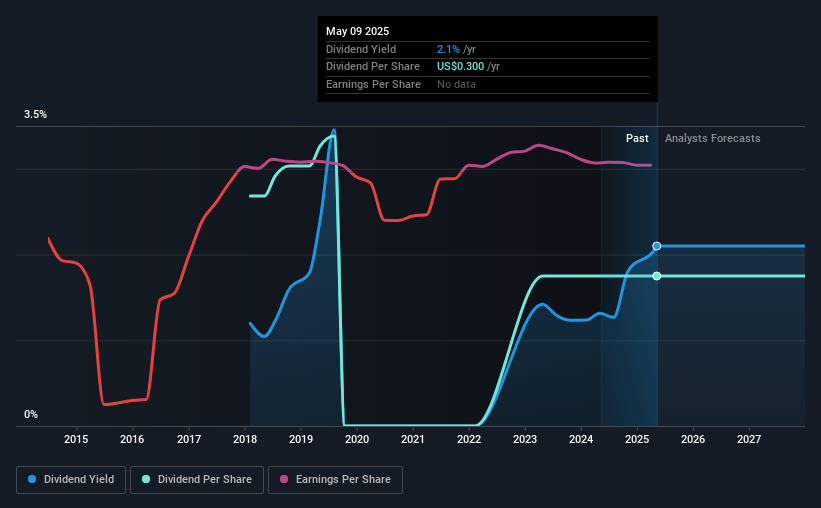
Peabody Energy Corporation (NYSE:BTU) stock is about to trade ex-dividend in 4 days. Typically, the ex-dividend date is one business day before the record date, which is the date on which a company determines the shareholders eligible to receive a dividend. The ex-dividend date is an important date to be aware of as any purchase of the stock made on or after this date might mean a late settlement that doesn't show on the record date. In other words, investors can purchase Peabody Energy's shares before the 15th of May in order to be eligible for the dividend, which will be paid on the 4th of June.
The company's next dividend payment will be US$0.075 per share, on the back of last year when the company paid a total of US$0.30 to shareholders. Based on the last year's worth of payments, Peabody Energy has a trailing yield of 2.1% on the current stock price of US$14.29. Dividends are a major contributor to investment returns for long term holders, but only if the dividend continues to be paid. So we need to check whether the dividend payments are covered, and if earnings are growing.
Dividends are usually paid out of company profits, so if a company pays out more than it earned then its dividend is usually at greater risk of being cut. Peabody Energy has a low and conservative payout ratio of just 10% of its income after tax. Yet cash flows are even more important than profits for assessing a dividend, so we need to see if the company generated enough cash to pay its distribution. Luckily it paid out just 19% of its free cash flow last year.
It's positive to see that Peabody Energy's dividend is covered by both profits and cash flow, since this is generally a sign that the dividend is sustainable, and a lower payout ratio usually suggests a greater margin of safety before the dividend gets cut.
Check out our latest analysis for Peabody Energy
Click here to see the company's payout ratio, plus analyst estimates of its future dividends.

Have Earnings And Dividends Been Growing?
Stocks in companies that generate sustainable earnings growth often make the best dividend prospects, as it is easier to lift the dividend when earnings are rising. If business enters a downturn and the dividend is cut, the company could see its value fall precipitously. It's encouraging to see Peabody Energy has grown its earnings rapidly, up 58% a year for the past five years. With earnings per share growing rapidly and the company sensibly reinvesting almost all of its profits within the business, Peabody Energy looks like a promising growth company.
Another key way to measure a company's dividend prospects is by measuring its historical rate of dividend growth. Peabody Energy has seen its dividend decline 5.9% per annum on average over the past seven years, which is not great to see. It's unusual to see earnings per share increasing at the same time as dividends per share have been in decline. We'd hope it's because the company is reinvesting heavily in its business, but it could also suggest business is lumpy.
To Sum It Up
Should investors buy Peabody Energy for the upcoming dividend? Peabody Energy has grown its earnings per share while simultaneously reinvesting in the business. Unfortunately it's cut the dividend at least once in the past seven years, but the conservative payout ratio makes the current dividend look sustainable. Overall we think this is an attractive combination and worthy of further research.
On that note, you'll want to research what risks Peabody Energy is facing. For example - Peabody Energy has 2 warning signs we think you should be aware of.
Generally, we wouldn't recommend just buying the first dividend stock you see. Here's a curated list of interesting stocks that are strong dividend payers.
Have feedback on this article? Concerned about the content? Get in touch with us directly. Alternatively, email editorial-team (at) simplywallst.com.
This article by Simply Wall St is general in nature. We provide commentary based on historical data and analyst forecasts only using an unbiased methodology and our articles are not intended to be financial advice. It does not constitute a recommendation to buy or sell any stock, and does not take account of your objectives, or your financial situation. We aim to bring you long-term focused analysis driven by fundamental data. Note that our analysis may not factor in the latest price-sensitive company announcements or qualitative material. Simply Wall St has no position in any stocks mentioned.